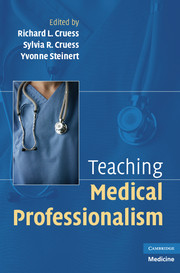Book contents
- Frontmatter
- Contents
- List of Contributors
- Foreword by William M. Sullivan
- Introduction
- PART ONE WHAT IS TO BE TAUGHT
- PART TWO THEORY
- PART THREE PRINCIPLES
- PART FOUR PRACTICE: CASE STUDIES IN TEACHING PROFESSIONALISM ACROSS THE CONTINUUM
- 12 Teaching Professionalism in a Traditional or Organ-Based Curriculum
- 13 Learning Professionalism in a Problem-Based Curriculum
- 14 Teaching Professionalism and Fostering Professional Values during Residency: The McGill Experience
- 15 Continuing Professional Development: A Focus on Professionalism
- APPENDIX A Definitions of Professionalism
- APPENDIX B Core Attributes of Professionalism
- APPENDIX C The Teaching of Professionalism: Vignettes for Discussion
- APPENDIX D A Matrix for “Matching” Teaching Methods to Attributes
- APPENDIX E Sample Grid for Use with Discussion of Vignettes
- APPENDIX F Sample Questions to Guide Discussion about the Social Contract: Small-Group Leaders' Guide with Suggested Responses
- APPENDIX G Professionalism Program for Residents: Suggested Outline for Small Group Facilitators
- APPENDIX H Sample Evaluation Form for Residents' Half-Day Program on Professionalism
- Index
- References
12 - Teaching Professionalism in a Traditional or Organ-Based Curriculum
Published online by Cambridge University Press: 01 September 2009
- Frontmatter
- Contents
- List of Contributors
- Foreword by William M. Sullivan
- Introduction
- PART ONE WHAT IS TO BE TAUGHT
- PART TWO THEORY
- PART THREE PRINCIPLES
- PART FOUR PRACTICE: CASE STUDIES IN TEACHING PROFESSIONALISM ACROSS THE CONTINUUM
- 12 Teaching Professionalism in a Traditional or Organ-Based Curriculum
- 13 Learning Professionalism in a Problem-Based Curriculum
- 14 Teaching Professionalism and Fostering Professional Values during Residency: The McGill Experience
- 15 Continuing Professional Development: A Focus on Professionalism
- APPENDIX A Definitions of Professionalism
- APPENDIX B Core Attributes of Professionalism
- APPENDIX C The Teaching of Professionalism: Vignettes for Discussion
- APPENDIX D A Matrix for “Matching” Teaching Methods to Attributes
- APPENDIX E Sample Grid for Use with Discussion of Vignettes
- APPENDIX F Sample Questions to Guide Discussion about the Social Contract: Small-Group Leaders' Guide with Suggested Responses
- APPENDIX G Professionalism Program for Residents: Suggested Outline for Small Group Facilitators
- APPENDIX H Sample Evaluation Form for Residents' Half-Day Program on Professionalism
- Index
- References
Summary
INTRODUCTION
Defining and understanding professionalism in medicine is a challenging undertaking. Translating that definition and understanding into the complex world of medical education is even more challenging. My goal in this chapter is to describe how these challenges are addressed in the setting of a traditional, or organ-based, medical school curriculum at the University of Washington School of Medicine (UWSOM).
Well into the UWSOM faculty's work on introducing medical professionalism into the curriculum, we became aware of the debate among medical education experts working in the field of professionalism between those who emphasize a didactic approach focusing on definitions and a specific knowledge base and those who emphasize narrative and experiential learning. Interestingly, through our work in developing and implementing a curriculum on professionalism, we have found it necessary to intertwine these two approaches as we attempt to create a successful curriculum. The theoretical debates between the two schools of thought both helped us to understand what we were already doing and to become more deliberate as we moved the professionalism curriculum forward. A merging of these two threads appears to be consistent with the direction this debate is taking for others as well.
Another interesting aspect of the complex undertaking involved in teaching medical professionalism became apparent in the course of our work. We learned that it is important to focus on an “aspirational” approach to professionalism in teaching this material.
- Type
- Chapter
- Information
- Teaching Medical Professionalism , pp. 211 - 224Publisher: Cambridge University PressPrint publication year: 2008



